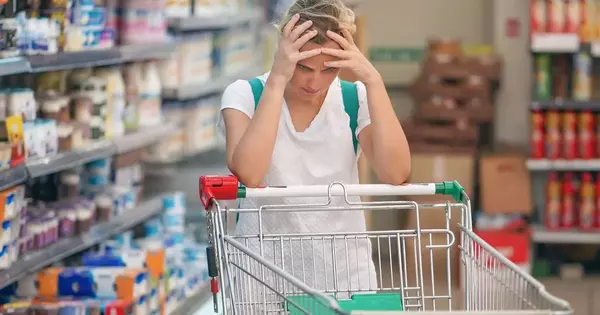
Proud and prosperous Sweden, with its famously generous welfare system and abundance of green energy, should – in theory – be better equipped than most European countries to bear a battering from the continent’s cost of living crisis.
In terms of GDP per capita, it is the EU’s fifth-richest member state. Natural gas accounts for only 2% of its energy, insulating it from the worst economic ravages of Russia’s war on Ukraine. Poverty is far below the European average.
But fast-rising electricity bills and surging food price inflation are taking their toll here as elsewhere. “Sweden also has a poverty problem,” said Johan Rindevall. “We may not talk about it much, but it’s there – and it’s absolutely got worse this year.”
Rindevall is well-placed to know. The 39-year-old former tech industry worker runs Matmissionen, or Food Mission, a unique chain of social supermarkets in Sweden that has expanded rapidly since January, more than doubling its customer numbers as it offers means-tested members the chance to shop for food for less.

Matmissionen’s eight stores – five in Stockholm, three of which opened this year, two in Gothenburg and one in Malmö – sell food donated by producers and retailers that is at risk of being wasted, usually because it has cosmetic blemishes, damaged packaging or a short sell-by date.
The organisation’s aim is threefold: to limit food waste, train new workers – about 70% of staff are on various job market insertion programmes, and 40% go on to find full-time work – and, above all, to sell food at very low prices to people who need it. Revenue from the stores also helps subsidise a separate foodbank operation with some donations distributed to NGOs working with those in the most extreme need, mostly the homeless.
Rindevall says Matmissionen works on the principle of sticking as close to a familiar shopping experience for its customers as it can. “Our focus groups show there’s a real stigma around food handouts. So we decided to let them buy what they want, albeit at a very steep discount … It’s just more empowering that way,” he says. “People want things to be as normal as possible.”
In fact anyone can shop at Matmissionen – but only registered members, who must book a slot to shop, get the lowest prices. Membership is open to those with a monthly income of less than 11,200 kronor (roughly £880) in pay or benefits. Membership prices are rock-bottom: five kronor (40p) for a loaf of bread, six for a kilo of bananas and 33 for 500g of minced beef.
It is an offer that is increasingly needed. Sweden’s welfare system has been steadily cut back in recent years, widening the gap between rich and poor and leaving more and more people vulnerable to inflation that has averaged about 8% this autumn.
Household incomes have also been hit by electricity bills that have in some cases doubled. More than 75% of Sweden’s electricity comes from hydropower, nuclear and wind, but it has not escaped the continent-wide energy price impacts of the war in Ukraine.
Petrol and food prices have soared too. The cost of butter is up by about 25% this year, meat by 24% and cheese by about 22%, according to consumer price comparison sites.

In practice, says Rindevall, 90-95% of purchases are by members, who can buy up to 300 kronor of food a week at the membership price – never more than 30% of the price in a discount supermarket – and as much as they want on top at a higher price. Few members are going hungry, but many are unable to afford a balanced diet: lots of carbs, little protein, few vegetables.
He says Matmissionen’s membership climbed from 7,200 in January to more than 14,700 by the end of October. The biggest group of newcomers, about 40% , are families with children, both single parents and couples. “Inflation at these rates mean we’re seeing many, many more people than ever before. Some have started coming in saying they don’t qualify as members, but can’t afford to buy the food they need anywhere else,” he says.
According to Sweden’s Central Statistics Office, during the country’s last major inflationary period in the early 1990s, about 7% of the population were in relative poverty – defined as living on 60% of less of the median income. This year, that percentage is estimated to be above 14%.
Matmissionen is drawing up expansion plans for new stores across the country. It recently reached agreements with both the Swedish food retailers’ association and the national federation of food producers and distributors, guaranteeing the support of almost the entire food sector.
“Sweden may still have a good safety net, but it maybe isn’t reactive enough to sudden, big cost of living changes,” says Rindevall.
“The only positive thing in all this is that now so many people are talking about impossible food prices that there’s no longer the same stigma in not being able to afford to feed your family. It’s no longer a taboo.”
• This article was amended on 5 and 6 December 2022. An earlier version misspelled the Swedish krona (plural: kronor) as “krone” and Gothenburg as “Gothenberg”.










